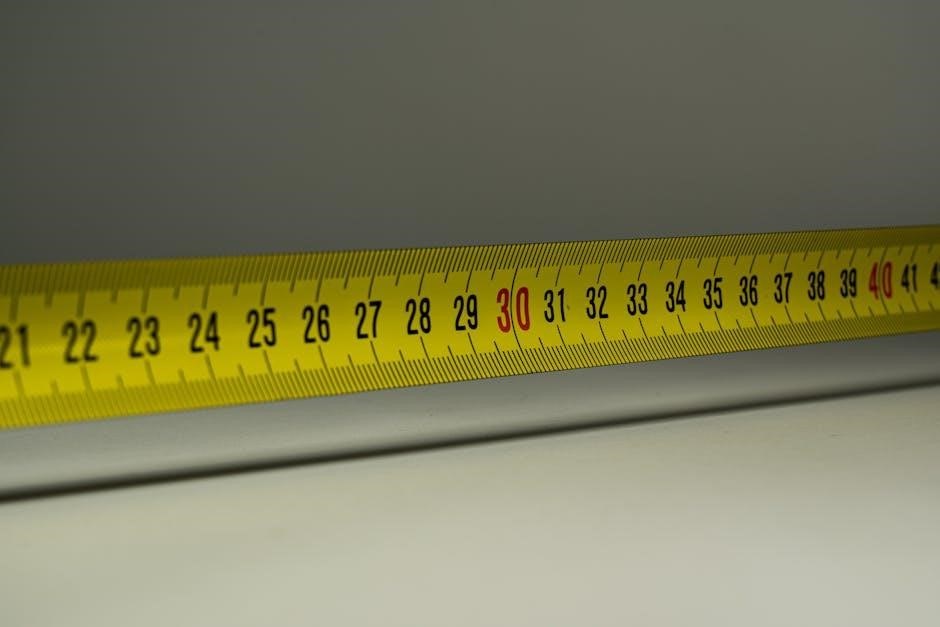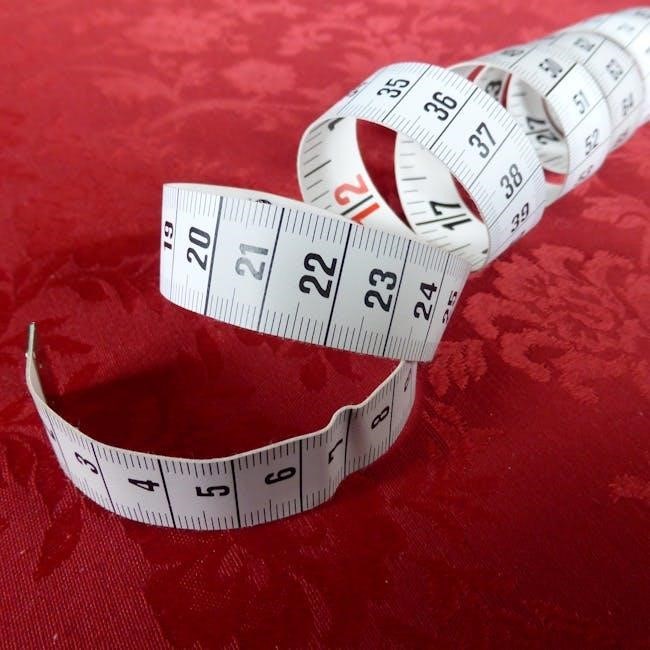The Carl Flesch Scale System is a comprehensive guide offering structured exercises in all major and minor keys‚ designed to enhance technical skill and musical expression.

Overview of the Scale System
The Carl Flesch Scale System is a cornerstone of violin pedagogy‚ offering a structured approach to technical and musical development. It provides a comprehensive set of exercises in all major and minor keys‚ organized to improve intonation‚ facility‚ and expressive control. The system includes twelve exercises per key‚ progressing through the circle of fifths‚ with alternating major and relative minor scales. Each exercise is designed to address specific technical challenges‚ such as finger dexterity and bowing techniques. Additionally‚ the system incorporates chromatic and octatonic scales for advanced players. Flesch’s method emphasizes consistent practice‚ making it a valuable resource for violinists seeking to refine their skills and expand their musical expression. The system remains widely used today‚ with PDF versions available for study and practice.
Importance of the Scale System in Violin Pedagogy
The Carl Flesch Scale System is a foundational resource in violin education‚ offering a structured approach to technical and musical development. Its comprehensive exercises in all major and minor keys provide a systematic way to improve intonation‚ finger dexterity‚ and bow control. The system’s emphasis on consistent practice and progression through the circle of fifths ensures a thorough understanding of tonal relationships. Widely regarded as essential for both students and teachers‚ it bridges technical proficiency with musical expression. Its adaptability to modern pedagogical needs has ensured its relevance‚ making it a cornerstone of violin training and a testament to Flesch’s enduring influence on violin pedagogy.
Historical Background of Carl Flesch
Carl Flesch was a renowned violinist and pedagogue‚ born in 1873‚ whose contributions to violin technique and education remain influential. His life was marked by both artistic acclaim and personal challenges‚ including financial struggles and wartime difficulties.
Biography of Carl Flesch
Carl Flesch‚ born in 1873 and passing away in 1944‚ was a distinguished violinist and influential music educator. His career was marked by both artistic success and personal challenges. He once owned the prestigious Brancaccio Stradivarius but was forced to sell it in 1928 following financial losses. During the 1930s‚ Flesch resided in London and endured imprisonment by the Gestapo in 1939‚ though he was later released. He spent his final years in Lucerne‚ Switzerland‚ where he died. Flesch’s legacy endures through his significant contributions to violin pedagogy‚ particularly the development of his renowned scale system‚ which remains a cornerstone in violin education.
Development of the Scale System
The Carl Flesch Scale System was developed as a comprehensive guide for violinists‚ first published in 1926 by Ries & Erler; It was later revised and expanded to meet the evolving demands of violin pedagogy. Designed as a supplement to Flesch’s seminal work‚ The Art of Violin Playing‚ the system provides a structured approach to mastering scales in all major and minor keys. The exercises are meticulously organized‚ focusing on technical precision‚ intonation‚ and musical expression. Flesch’s method includes detailed fingerings and bowing patterns‚ ensuring a holistic development of violin technique. Over time‚ the system has been adapted and refined‚ solidifying its place as a foundational resource for violin education.

Structure of the Carl Flesch Scale System
The system includes scales in all major and minor keys‚ chromatic scales‚ and exercises designed to improve technical proficiency and musical expression through structured practice.
Organization of Scales in Major and Minor Keys
The Carl Flesch Scale System meticulously organizes scales in all major and minor keys‚ following the circle of fifths. Each key includes twelve exercises‚ alternating between major and relative minor‚ ensuring a deep understanding of tonal relationships. The system progresses from simpler to more complex patterns‚ incorporating varied articulations and dynamics to enhance musicality. This structured approach allows violinists to build technical proficiency while developing a strong sense of intonation and phrasing. By systematically exploring all keys‚ the system fosters a comprehensive mastery of the fingerboard and bow techniques‚ making it an indispensable tool for advancing violinists.
Exercises and Fingerings for Technical Proficiency
The Carl Flesch Scale System includes meticulously designed exercises and fingerings to cultivate technical mastery. Each scale is accompanied by specific fingerings tailored to enhance dexterity‚ intonation‚ and bow control. The system incorporates chromatic scales‚ arpeggios‚ and double stops to address advanced techniques. Flesch’s approach emphasizes consistent tone production and precise fingering patterns‚ ensuring evenness across the fingerboard. Additionally‚ alternative fingerings are provided for challenging passages‚ aiding violinists in developing a reliable technique. These exercises are structured to gradually build proficiency‚ from foundational skills to complex virtuosic demands. By focusing on both left-hand and bowing techniques‚ the system ensures a comprehensive approach to technical development‚ making it a cornerstone for aspiring violinists;

Benefits of the Carl Flesch Scale System
The system enhances technical proficiency‚ improving intonation‚ bow control‚ and finger dexterity. It fosters musicality and expressive precision‚ providing a structured path to mastery for violinists.
Improving Technical Skill and Intonation
The Carl Flesch Scale System is renowned for its ability to enhance technical proficiency and intonation accuracy. By systematically practicing scales in all major and minor keys‚ violinists develop precise finger placement and bow control. The exercises are designed to strengthen finger dexterity‚ improve pitch accuracy‚ and refine tone production. Flesch’s structured approach ensures that musicians build a solid technical foundation‚ which is essential for mastering complex repertoire. The system’s emphasis on scales in three octaves further aids in developing consistency across the instrument’s range. This rigorous practice not only sharpens intonation but also fosters a deeper understanding of musical structure‚ making it an indispensable tool for violinists seeking technical excellence and artistic expression.
Enhancing Musicality and Expressive Control
The Carl Flesch Scale System not only refines technical skills but also nurtures musicality and expressive control. By mastering scales in all keys‚ violinists gain a deeper understanding of musical structure‚ enabling them to phrase and articulate with greater sensitivity. The system’s exercises encourage players to explore dynamics‚ tone color‚ and rhythmic precision‚ essential for conveying emotion in performances. Flesch’s approach fosters a connection between technical proficiency and artistic expression‚ allowing musicians to interpret repertoire with nuance and depth. This holistic development ensures that scales become more than mere exercises—they serve as a foundation for expressive and engaging musical interpretation.

Practical Application of the Scale System
The Carl Flesch Scale System offers a structured approach to daily practice‚ with exercises in all major and minor keys to improve intonation‚ technique‚ and musical expression.

Daily Practice Routine Using the Scale System
The Carl Flesch Scale System is designed for consistent daily practice‚ offering a structured approach to improving technical skill and musical expression. By focusing on scales in all major and minor keys‚ violinists can enhance intonation‚ finger dexterity‚ and bow control. The system recommends starting with scales in three octaves‚ followed by arpeggios and chromatic exercises to build facility. Each key is explored through the circle of fifths‚ ensuring a logical progression and mastery of tonal relationships. Regular practice of these exercises fosters a strong technical foundation while nurturing musicality. The system’s clear organization makes it accessible for both students and advanced players‚ providing a comprehensive tool for daily study and long-term development.
Advanced Techniques for Mastery
Advanced techniques within the Carl Flesch Scale System involve refining intricate fingerings‚ bowing patterns‚ and expressive nuances. Players are encouraged to explore double stops‚ chords‚ and chromatic scales to expand technical mastery. The system emphasizes varying dynamics‚ articulations‚ and phrasings to enhance musicality. For advanced players‚ Flesch recommends practicing scales in multiple octaves with precise intonation and rhythmic accuracy. Additionally‚ focusing on the circle of fifths progression helps solidify key relationships and tonal awareness. By incorporating these advanced exercises‚ violinists can achieve a polished and expressive performance quality while deepening their understanding of the system’s foundational principles. Regular practice of these techniques ensures comprehensive mastery and artistic interpretation.

Legacy and Modern Relevance
The Carl Flesch Scale System remains a cornerstone of violin pedagogy‚ influencing generations of violinists. Its structured approach continues to be adapted by modern teachers and players worldwide.
Influence on Contemporary Violin Teaching
The Carl Flesch Scale System has profoundly shaped modern violin pedagogy‚ offering a structured approach to technical development. Its emphasis on scales in all major and minor keys provides a foundation for intonation‚ facility‚ and musical understanding. Many contemporary violin teachers incorporate Flesch’s exercises into their curriculum‚ valuing their systematic progression and comprehensive coverage of keys. The system’s focus on expressive control and technical precision aligns with modern teaching goals‚ ensuring its relevance in today’s violin education. By providing a clear‚ methodical framework‚ Flesch’s work continues to inspire both instructors and students‚ fostering a connection between technical mastery and artistic expression.
Adaptations and Modifications for Modern Players
The Carl Flesch Scale System has undergone revisions to meet the evolving needs of modern violinists. A revised and enlarged edition‚ published in collaboration with Max Rostal‚ incorporates updated fingerings and bowing patterns‚ ensuring relevance for contemporary players. The system now includes exercises in chromatic and octatonic scales‚ addressing advanced technical demands. Digital versions‚ such as PDFs‚ offer easy access and flexibility for today’s learners. These adaptations maintain the system’s core principles while expanding its scope to accommodate diverse musical styles and pedagogical approaches. By integrating modern techniques and technologies‚ the Flesch Scale System remains a vital resource for violinists seeking technical mastery and artistic expression.
